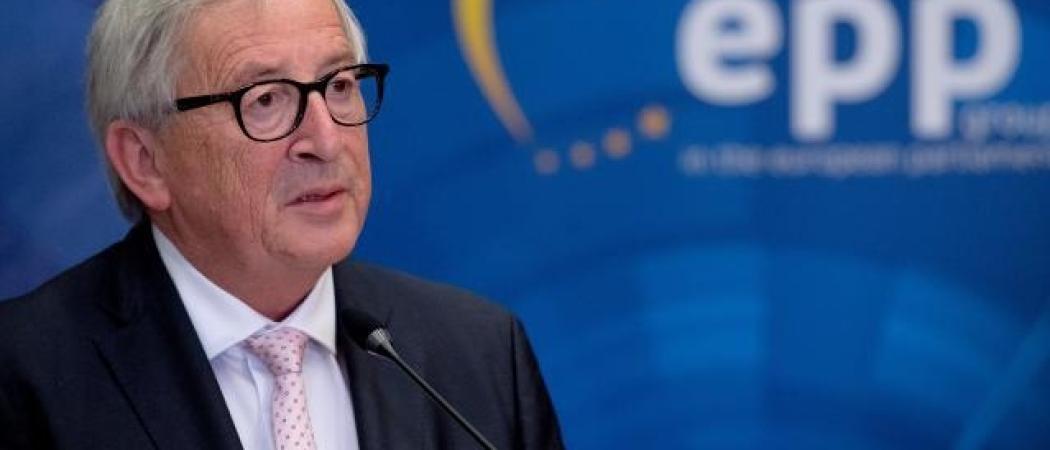Swiss failure to endorse the treaty could cause headwinds for business, cross-border stock trading and research collaboration

European Commission President Jean-Claude Juncker (Source: EC - Audiovisual Service, 2019)
European Commission President Jean-Claude Juncker said he is ready to clarify any doubts with Switzerland on a new accord intended to refine bilateral ties, but the draft treaty being presented by Brussels will not be renegotiated - and needs to be signed before June 18.
The treaty, which was negotiated over four years, aims to simplifying the future relationship with the EU. It would see non-EU member Switzerland regularly adopt EU single market rules and have EU citizens in Switzerland gain the same rights as in their home countries.
Failure to endorse and begin ratifying the new treaty could damage Swiss ties with its biggest trading partner, disrupting commerce, EU research collaboration and cross-border stock trading.
In a note of warning, Juncker said in an open letter published on Tuesday this it is impossible to predict what the fate of the agreement would be if the deal was not signed before his mandate ends in October.
The most obvious consequence of no-deal on the treaty is that the European Commission will not extend beyond mid-2019 the recognition of Swiss stock exchange rules that lets EU investors make trades there.
But Switzerland’s application for membership to the EU’s next research programme, the €94.1 billion Horizon Europe, could also be made contingent on progress on the political accord.
EU officials have already served notice that they want these negotiations to be broad – going beyond research alone, to also include such issues as trade, finance and free movement across the border.
The Swiss government is “broadly positive” on the treaty, but is demanding clarifications from Brussels on several issues before signing. The Swiss cabinet said last week that following a national consultation with business groups, unions and local authorities, provisions relating to wage and worker protection, state subsidies and citizens' rights still need to be clarified.
Two out of three Swiss companies want their government to sign the treaty, a poll for business lobby Economiesuisse found last week.
But the hotly debated treaty contains provisions that are controversial in Switzerland, which has long struggled to accommodate domestic demands on issues such as immigration with those of the EU. It has been opposed both by the eurosceptic political right and labour unions on the left because of concerns that it could put downward pressure on wages, which are much higher than in neighbouring EU countries.
A Swiss election will take place in October, with opinion polls indicating strong support for populists who want to reject the treaty.
The president of Switzerland’s top-ranked university, ETH Zurich, has warned that failure to agree a new arrangement on research will damage both sides. “We have developed a very successful way to interact with the EU. We should be careful not to damage this special relationship. That would be a loss for both sides,” Joël Mesot, president of ETH Zurich, told Science|Business last week.
Brussels has previously demonstrated it is willing to play hardball with the Swiss on research, and issue reprisals for rule-breaking.
In February 2014, Swiss voters narrowly backed quotas on immigration from neighbouring EU countries, in violation of the EU’s principle of free movement of people. As a result, Switzerland was cut off from two-thirds of the EU’s €77 billion Horizon 2020 R&D programme.
During the 2014 ban, Swiss researchers suddenly became a risky proposition for inclusion in research consortia, a situation paralleled today in the UK, with uncertainty about the consequences of Brexit limiting the appeal of forming partnerships with UK researchers and companies.
Switzerland eventually negotiated a truce with Brussels in December 2016. The thaw came after Swiss politicians watered down the controversial immigration controls, in a compromise bill that avoided outright quotas. EU funding levels have yet to recover fully. The net loss over the life of the seven-year programme is CHF734 million, the Swiss government recently estimated.
Though never an EU member, Switzerland follows many of the bloc’s rules, in exchange for access to EU markets and programmes via a web of more than 120 bilateral contracts and has participated in EU research programmes since 1992. In 2004, it became a full associate partner (there are 15 associate research partners today).
This status allows scientists based in Switzerland to lead EU-funded research projects, and Swiss institutes to host scientists on European Research Council grants, in return for a payment based on the ratio of Switzerland's GDP to that of all EU member states. Switzerland traditionally does very well out of this arrangement. Between 2007 and 2013, for instance, it received CHF219 million (€187 million) more than it put in.





 A unique international forum for public research organisations and companies to connect their external engagement with strategic interests around their R&D system.
A unique international forum for public research organisations and companies to connect their external engagement with strategic interests around their R&D system.